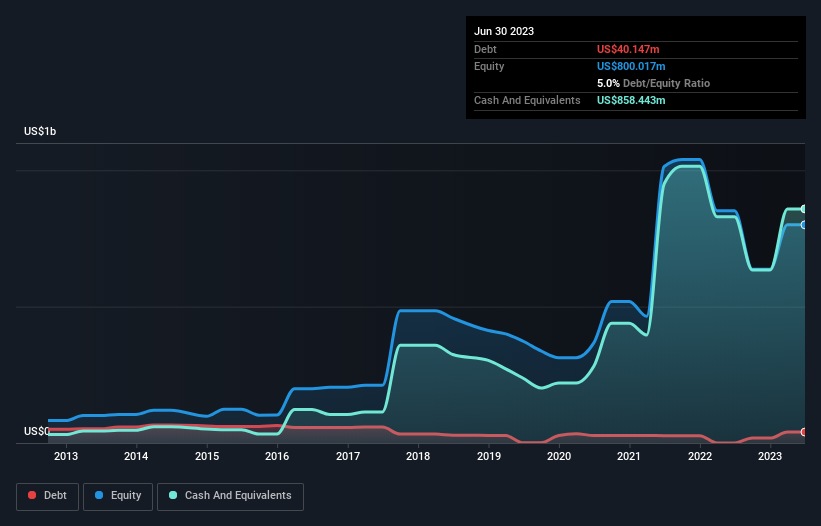
Warren Buffett famously said, 'Volatility is far from synonymous with risk.' When we think about how risky a company is, we always like to look at its use of debt, since debt overload can lead to ruin. We can see that HUTCHMED (China) Limited (LON:HCM) does use debt in its business. But the real question is whether this debt is making the company risky.
Why Does Debt Bring Risk?
Debt and other liabilities become risky for a business when it cannot easily fulfill those obligations, either with free cash flow or by raising capital at an attractive price. If things get really bad, the lenders can take control of the business. However, a more frequent (but still costly) occurrence is where a company must issue shares at bargain-basement prices, permanently diluting shareholders, just to shore up its balance sheet. Of course, plenty of companies use debt to fund growth, without any negative consequences. When we think about a company's use of debt, we first look at cash and debt together.
Check out our latest analysis for HUTCHMED (China)
What Is HUTCHMED (China)'s Net Debt?
As you can see below, at the end of June 2023, HUTCHMED (China) had US$40.1m of debt, up from US$418.0k a year ago. Click the image for more detail. But on the other hand it also has US$858.4m in cash, leading to a US$818.3m net cash position.

How Strong Is HUTCHMED (China)'s Balance Sheet?
According to the last reported balance sheet, HUTCHMED (China) had liabilities of US$340.9m due within 12 months, and liabilities of US$156.6m due beyond 12 months. On the other hand, it had cash of US$858.4m and US$166.1m worth of receivables due within a year. So it actually has US$527.1m more liquid assets than total liabilities.
This surplus suggests that HUTCHMED (China) is using debt in a way that is appears to be both safe and conservative. Given it has easily adequate short term liquidity, we don't think it will have any issues with its lenders. Simply put, the fact that HUTCHMED (China) has more cash than debt is arguably a good indication that it can manage its debt safely. There's no doubt that we learn most about debt from the balance sheet. But ultimately the future profitability of the business will decide if HUTCHMED (China) can strengthen its balance sheet over time. So if you want to see what the professionals think, you might find this free report on analyst profit forecasts to be interesting.
In the last year HUTCHMED (China) wasn't profitable at an EBIT level, but managed to grow its revenue by 89%, to US$757m. Shareholders probably have their fingers crossed that it can grow its way to profits.
So How Risky Is HUTCHMED (China)?
While HUTCHMED (China) lost money on an earnings before interest and tax (EBIT) level, it actually generated positive free cash flow US$2.4m. So taking that on face value, and considering the net cash situation, we don't think that the stock is too risky in the near term. We think its revenue growth of 89% is a good sign. We'd see further strong growth as an optimistic indication. The balance sheet is clearly the area to focus on when you are analysing debt. But ultimately, every company can contain risks that exist outside of the balance sheet. For instance, we've identified 1 warning sign for HUTCHMED (China) that you should be aware of.
If, after all that, you're more interested in a fast growing company with a rock-solid balance sheet, then check out our list of net cash growth stocks without delay.
Valuation is complex, but we're here to simplify it.
Discover if HUTCHMED (China) might be undervalued or overvalued with our detailed analysis, featuring fair value estimates, potential risks, dividends, insider trades, and its financial condition.
Access Free AnalysisHave feedback on this article? Concerned about the content? Get in touch with us directly. Alternatively, email editorial-team (at) simplywallst.com.
This article by Simply Wall St is general in nature. We provide commentary based on historical data and analyst forecasts only using an unbiased methodology and our articles are not intended to be financial advice. It does not constitute a recommendation to buy or sell any stock, and does not take account of your objectives, or your financial situation. We aim to bring you long-term focused analysis driven by fundamental data. Note that our analysis may not factor in the latest price-sensitive company announcements or qualitative material. Simply Wall St has no position in any stocks mentioned.
About AIM:HCM
HUTCHMED (China)
HUTCHMED (China) Limited, together with its subsidiaries, discovers, develops, and commercializes targeted therapeutics and immunotherapies for cancer and immunological diseases in Hong Kong and internationally.
High growth potential with adequate balance sheet.

